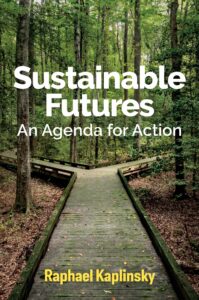 Drawing on centuries of economic history, in his new book, Sustainable Futures, Raphael Kaplinksy argues that there are two big lessons to learn to achieve rapid transition. First, that we need a systemic response, because adequate action can only succeed if it is accompanied by full spectrum changes in the distribution of power, in values and norms, and in lifestyles and institutions. Secondly, that we cannot do everything at once, so sequencing is key. Our priorities should be: to reign in the dominance of speculative financial capital and redirect it to meet the needs of a more environmentally sustainable economy; then reign in the power of the plutocracy to better share the fruits of human activity, and to control policies, norms and values; and at the same time drive a rapid and smart Green New Deal.
Drawing on centuries of economic history, in his new book, Sustainable Futures, Raphael Kaplinksy argues that there are two big lessons to learn to achieve rapid transition. First, that we need a systemic response, because adequate action can only succeed if it is accompanied by full spectrum changes in the distribution of power, in values and norms, and in lifestyles and institutions. Secondly, that we cannot do everything at once, so sequencing is key. Our priorities should be: to reign in the dominance of speculative financial capital and redirect it to meet the needs of a more environmentally sustainable economy; then reign in the power of the plutocracy to better share the fruits of human activity, and to control policies, norms and values; and at the same time drive a rapid and smart Green New Deal.
We live in perilous times. Drawing on lessons learned from three centuries of economic expansion, Sustainable Futures provides an agenda for achieving a more environmentally, socially and economically sustainable world.
The environment is a system, or more accurately it is a system of systems. This means that developments in one part of the system are influenced by and have consequences for other parts of the system. Measures to ‘fix’ a particular problem will thus invariably require a systemic approach addressing a range of developments outside of the disturbance. The bigger the disruption to the environment, the more likely any disturbance will reverberate elsewhere and the greater the need for a systemic response.
Similarly, the environment is itself embedded in a broader system of social and economic relations. In the same way that our capacity to fix’ a particular environmental problem will be limited by these wider interactions in the environment, so too our capacity to address environmental challenges will require us to consider the inter-relationship between the environment, society and the economy.
We find ourselves in an era of overlapping environmental, economic and social crises. Since the mid 1970s the trend rate of economic growth in the high income world has been falling, accompanied by a series of financial crises, exaggerated (but not caused by) the covid pandemic. Over the same time period, both inequality and absolute poverty have worsened in these countries. The spread of liberal democracy and the welfare state which characterised the post war decades have increasingly given way to a world of social conflict, accompanied by the rise of populism and culture wars.
These overlapping crises are structurally inter-related. The crisis in our environment is caused by the character of our economic system and feeds back to undermine our capacity for sustained economic growth. Populist governments hold back our capacity to address environmental problems, and at the same time disruptive climate change and other environmental crises threaten to reinforce the power of the plutocracy and populist leaders.
How do we understand these co-evolving crises in the environment, in society and in the economy? The answer is to be found in recognising that the systemic crisis in which we find ourselves is not unique. Since the onset of the Industrial Revolution at the beginning of the eighteenth century, the major economies have passed through four large waves of economic ‘progress’ and subsequent ‘decay’. We refer to these waves as techno-economic paradigms. In each case a dominant new ‘heartland technology’ emerged. It vastly increased productivity, could be used across all sectors of economic and social interaction, experienced dramatic reductions in price and was in virtually unlimited supply. In each case these heartland technologies enabled producers not only to be more productive but also to penetrate larger and more distant markets. In time each of these paradigms decayed and was supplanted by a new heartland technology, heralding an extended period in which a new paradigm came to dominate. Each paradigm lasted about 60-70 years.
The first of these techno-economic paradigms was fuelled by water power and the construction of canals. The second was driven by steam power and railroads, the third by steel, heavy engineering, steamships and telegraphy. The fourth, which dominated the twentieth century was the Mass Production paradigm. It experienced its heyday in the ‘Golden Age’ between 1950 and the mid-1970s. It then began to decay and although it was ‘rescued’ by deep globalisation from the mid 1980s, the structural crisis in the paradigm resulted in the Great Recession of 2008.
The degrading Mass Production paradigm is now in a parlous state. The sustainability of economic growth is questionable, even absent the ravages of the covid pandemic. Social relations are increasingly decaying and descending into an ‘Age of Rage’. Populist governments are widespread. These developments are a direct consequence of the character of a large scale productive system in which production and consumption are increasingly separated, supply chains are extended, and formerly prosperous regions in the industrial heartlands of the high income countries have been hollowed out. In the environmental sphere, the ‘Great Acceleration’ after the 1950s has resulted in an increasingly rapid descent into stretched and overwhelmed planetary boundaries, climate chaos, climate change and species destruction. All of these developments are systemically interrelated.
At the same time as the Mass Production Paradigm began to decay from the early 1980s, so did a new heartland technology emerge – Information and Communications Technology (ICT). Just as water and steam power increased productivity, and steamships, railroads and telegraphy widened market reach, so too does ICT hold the potential for renewed and sustainable growth. Its transformative capacity provides for greater peer to peer communication and its flexibility is increasingly shortening global supply chains and bringing production and consumption closer together. As in the extraordinary and rapid development of Covid vaccines, The Green New Deal – surely the only solution to our environmental crisis – can only be achieved through the rapid and widespread deployment of the ICT heartland technology.
Although ICTs – complemented of course by developments in the social and political sphere, in values, customs and norms – offer us a route to a more economically, socially and environmentally sustainable world, they simultaneously also provide the scope for deepening unsustainability. Automated weaponry, increased surveillance, cybercrime and new and environmentally destructive products and processes represent the dark side of the new paradigm.
Hence directionality is key. How do we use the potential of the new paradigm to enhance sustainability rather than to continue our plunge into darkness? Five key steps are required – we need to reign in the power of the financial sector and direct its actions to support a greening economy and society; we need to directly tackle the power of the plutocracy to shape our value systems and political processes; we need not just a Green New Deal, but a SMART Green New Deal taking full advantage of the transformative potential offered by ICTs; we need to simultaneously promote enhanced supra-national governance of the environment and the predatory actions of large transnational firms and to decentralise agency and governance to the local level; and we need to promote global development not just because it is an ethical challenge but also because we cannot solve our environmental and economic challenges by merely addressing the character of economic, social and environmental interactions in the world’s leading economies.
Easier said than done! Who can provide this directionality and in the urgent time-frame which is clearly essential if we are to prevent the descent into catastrophically damaging climate chaos and climate change? Clearly the private sector has a lead role to play. So too has government. But it’s not a matter of states OR markets, rather one of states AND markets. Civil society also has a critical role to play, not only as direct actors in the production and the delivery of services, but they also in playing an important role in shaping norms and values, in holding the private sector to account and in influencing government policies. Thus we need to build coalitions of actors across the range of societal stakeholders. This is not easy, as different stakeholders have different objectives. However there is progress, and in some cases (as in the diffusion of renewable energy) progress is increasingly rapid. Governments are beginning to act responsibly, and the corporate sector is responding to civil society pressure with the rapid rollout of ESG (environment, social and governance) programmes. But coalitions are fragile, often transitory and require the ‘winners’ to compensate the ‘losers’ as we move to a more sustainable future.
This is a big and complex agenda. But it’s blindingly obvious we have little time to lose. Two key lessons can help to build a speedy trajectory of change. First, because the paradigms are systems, they require a systemic response. An environmental agenda adequate to meet the systemic challenges which we confront can only succeed if it is accompanied by changes in the distribution of power, in values and norms, in lifestyles and in institutions, across the spectrum of social and economic activities. Secondly, we cannot do everything at once, so sequencing is key. The key sequencing priorities are as follows – reign in the dominance of speculative financial capital and redirect it to meet the needs of a more environmentally sustainable economy; reign in the power of the plutocracy to appropriate the fruits of human activity and to control policies, norms and values; and at the same time to drive the SMART Green New Deal at the fastest pace possible.
Raphael Kaplinsky’s latest book, Sustainable Futures: An Agenda for Action (available from Polity with a 20% discount, the book’s page using code POL21 at checkout).
